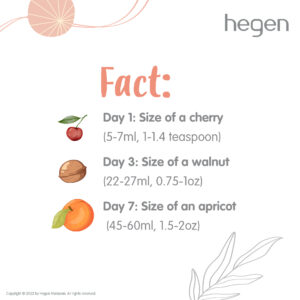About Hegen, For Moms
Breastfeeding 101: Tips for New Mommies
Breastfeeding is the greatest gift from a mother to her baby. It may not be an easy task nor a smooth-sailing journey. Yet as a mother, we always wanted the best for our children, don’t we?
Breast milk is the best food for a baby as it contains all the vital nutrients your baby needs to grow such as carbohydrates, proteins, fats, and various vitamins & minerals. and. As well as water, to keep your baby hydrated. Therefore, many mommies choose to breastfeed their child for at least the first 6 months since day one.
Oftentimes, if you are wondering whether you are producing enough breastmilk for your little one or worry that you aren’t feeding your baby well, let’s continue to explore this together in the next paragraph.
How much milk is enough for my baby?

For new born babies, their stomach size is similar to the size of a cherry on day 1. Super tiny! Hence, they only need approximately 5-7ml breast milk, which is equal to 1-1.14 teaspoon. Don’t worry! Your breast will start producing colostrum when you’re 16 weeks pregnant. Colostrum is thick and often light yellow in
On day 3, their stomach grows to the size of a walnut, and able to take much more milk around 22-27ml (near to 1oz). Whereas on day 7, it’s as big as an apricot! Your baby needs frequent small feeds due to their tiny stomach sizes (every 1-2 hourly, 10-30 minutes per feed). If they seem to be overly-attached to you at some time, they might be going through growth spurts!
Tips: The more you breastfeed, the more your baby’s sucking will stimulate your breast milk supply and the more milk you’ll made.
What are the most common Breastfeeding problems?
There are many challenges that a new nursing mom might face during their breastfeeding journey. But, most of the breastfeeding challenges are very common and there are tested & proven ways that are helpful in overcoming them on your own. Here are the several common breastfeeding issues:
- Engorgement
- Latching problems
- Poor milk supply
How should mommies tackle each of them?
Problem 1: Engorgement – One of the most common issues. This happens when the breastmilk is not fully expressed out, thus leading to the breast being engorged when more milk comes in.
Tips:
Before latching
Apply a warm compress to your breasts to encourage milk let down.
During pumping and feeding
Fellow mommies, please make sure your milk is drained completely and, try to keep up with the pumping and feeding schedule (if possible) to minimize engorgement.
You may also try it with Hegen Manual Breast Pump as it’d be really helpful in clearing your breasts completely according to our Hegen moms.
If engorgement happens, do not panic mommies! You may take a warm compress and massage the affected breast area lightly until it subsides. Some mommies also suggested to apply a cold compress or ice pack on your breasts as it could help to relieve the pain and swelling.
Problem 2: Latching problem – Every mommy and baby are different. Thus, take some time to explore and find a comfortable nursing hold that works for both of you and your baby. You can learn more about it in your prenatal classes or from the good maternity guides and trusted video sources.

Tips: Above image has shown some of the known breastfeeding positions that you may try out with your little one. Generally, if a baby’s entire mouth is opened and attached beyond the areola and that is a proper latch! It might take several tries before both of you find a suitable and comfortable latching position for a successful latch. So, keep on trying and don’t give up!
Problem 3: Poor milk supply – And this is one of the most fearful scenarios for most of the mommies who are having a low supply of breast milk for their baby. Low milk supply is when mum is unable to meet baby’s milk appetite. The clearest indicator that baby may not be getting enough milk is when baby is not gaining weight as per the recommended weight percentile chart.

Tips: To ensure a more consistent milk flow, you may build a regular pumping and feeding schedule and follow the schedule daily. Bear in mind that stress will reduce the chance of getting milk flow, Hence, it is important to destress, relax and not to get too hung up, mommies!
Another tip by Yvon (Hegen’s CEO & Founder) is that drink a lot warm milk, hot soups, and red dates. These can help to boost your milk supply too!
Remember, you are not alone during this journey. Having a great support system consisting your closed family & friends can be super helpful as well. Also, seek guidance from a lactation consultant if need more professional help. Cheers mommies! You can do this!


